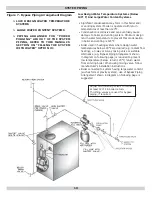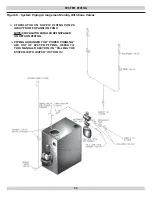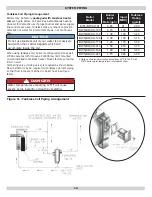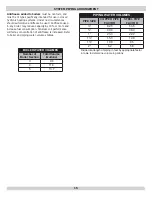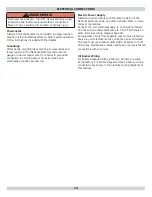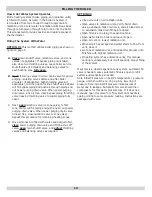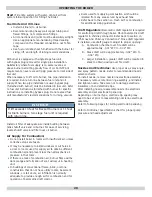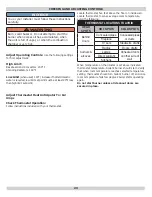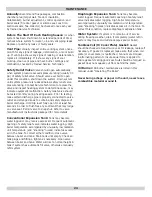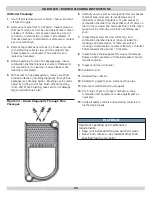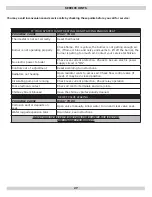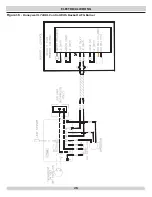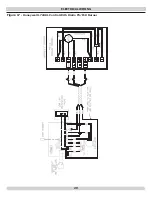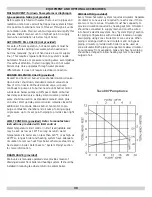
24
Annually
:
Recommend
fl
ue passages, combustion
chamber area (target wall,
fi
re door insulation,
durablanket), burner adjustment, control operation, and
boiler seals (
fi
re door gasket or silicone seal, cast iron
sectional seals,
fl
ue collector) be checked once each year
by trained Service Technician.
Before The Start Of Each Heating Season
(or when
system has been shut down for extended periods of time)
recheck whole system for water, oil, and vent piping leaks.
Replace or patch any leaks or faulty seals.
Vent Pipe:
Visually inspect entire venting system once a
month for any signs of leakage, deterioration, or soot build
up. If vent pipe shows any signs of leaking or deterioration,
replace it immediately. If it shows any signs of soot
build up, clean vent pipe and have burner settings and
combustion checked by trained Service Technician.
Safety Relief Valve:
Valve should open automatically
when system pressure exceeds pressure rating (usually 30
psi) of safety relief valve. Should valve ever fail to open
under this condition, shut down the system. Drain system
until system pressure is reduced below safety relief valve
pressure rating. Contact Service Technician to replace the
valve and inspect heating system to determine cause, may
indicate equipment malfunction. Safety relief valve should
be tested monthly during heating season. Prior to testing,
make certain discharge pipe is properly connected to valve
outlet and arranged so as to contain and safely dispose of
boiler discharge. Hold trip lever fully open for at least
fi
ve
seconds in order to
fl
ush free any sediment that may lodge
on valve seat. Permit valve to snap shut. Refer to valve
manufacturer’s instructions packaged for more details.
Conventional Expansion Tank
:
Tank may become
water logged or may receive excess air. Frequent automatic
opening of safety relief valve indicates water logging. High
boiler temperature accompanied by unusually low radiation
unit temperature (and “knocking” noises) indicates excess
air in the tank. To correct either condition, close valve
between boiler and tank. Drain tank until empty. Check all
tank plugs and
fi
ttings, tighten as necessary. Open valve
between boiler and tank. Water will rise to normal height in
tank if system has automatic
fi
ll valve, otherwise manually
re
fi
ll system.
Diaphragm Expansion Tank
:
Tank may become
water logged. Frequent automatic opening of safety relief
valve indicates water logging. High boiler temperature
accompanied by unusually low radiation unit temperature
(and “knocking” noises) indicates excess air in the tank. To
correct this condition, replace diaphragm expansion tank.
Water System:
If system is to remain out of service
during freezing weather, drain it completely (water left in
system may freeze and will crack pipes and/or boiler).
Tankless Coil (Or Cover Plate) Gasket:
Gasket
should be checked at least twice year for leakage, replace if
necessary. If gasket is replaced, make sure that when coil
plate (or cover plate) is reattached, ten nuts are torqued
in alternating pattern to insure equal force is applied to
entire gasket creating good seal. Nuts should be torqued so
gasket does not squeeze out from behind the plate.
Oil Burner:
Oil burner maintenance is listed in this
manual under “Operating The Boiler”.
Never burn garbage or paper in the unit, never leave
combustible material around it.
MAINTENANCE
Summary of Contents for BW4BAH-91
Page 22: ...22 OPERATING THE BOILER Figure 13 Burner Adjustments and Settings...
Page 28: ...28 ELECTRICAL WIRING Figure 16 Honeywell L7248L Control With Beckett AFG Burner...
Page 29: ...29 Figure 17 Honeywell L7248L Control With Riello F5 F10 Burner ELECTRICAL WIRING...
Page 31: ...NOTES...
Page 32: ...CAC BDP 7310 West Morris St Indianapolis IN 46231...

